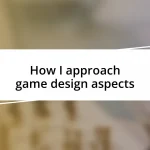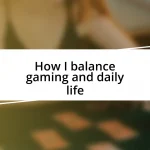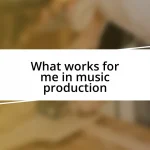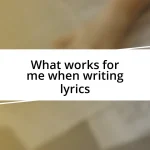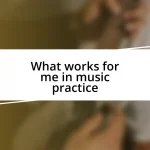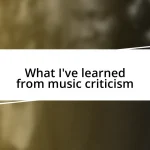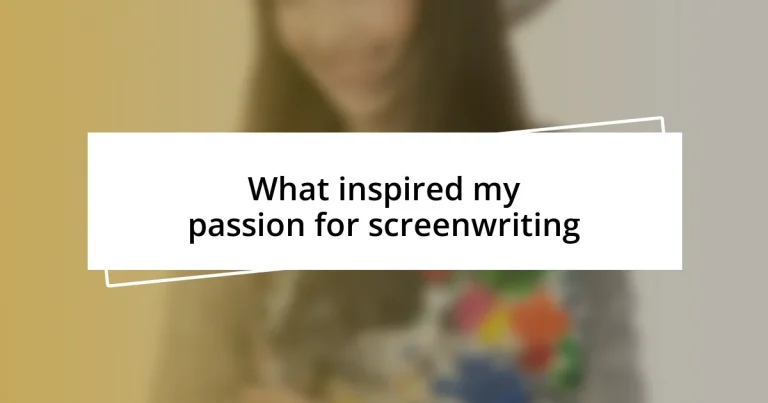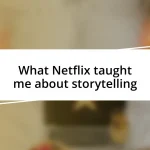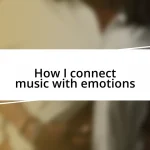Key takeaways:
- Being cast in a high school drama class highlighted the emotional connection that dialogue can create with an audience.
- Attending a local film festival inspired a desire to craft stories that resonate deeply with viewers.
- Participating in a screenwriting course emphasized the importance of structure and intention in storytelling, solidifying the commitment to mastering the craft.
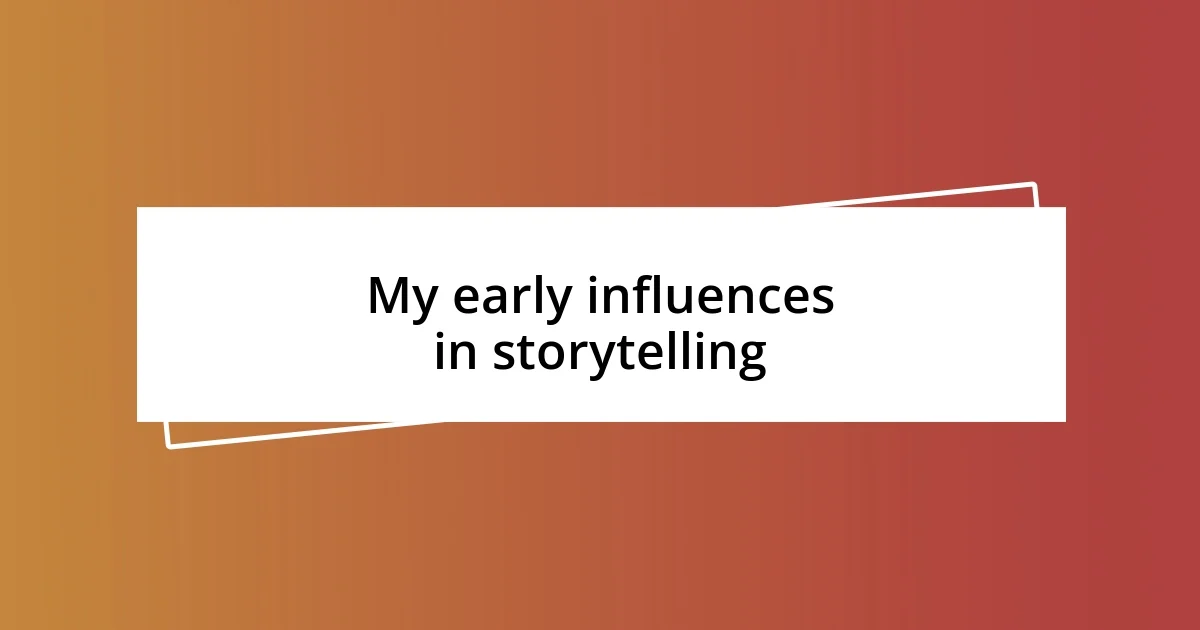
My early influences in storytelling
Growing up, I was always captivated by the stories my grandmother told me, sitting on her porch during summer evenings. It wasn’t just the tales themselves that enchanted me; it was the way she brought characters to life, weaving in emotions that made my young heart race. I often found myself wondering how she conjured such vivid images in my mind—was it magic or simply the power of storytelling?
I remember vividly the first time I saw a film that truly left an impression on me—“The Wizard of Oz.” The vibrant colors, the unforgettable songs, and the journey of self-discovery sparked something deep within me. I couldn’t help but ask myself, how did they create such a fantastical world? This experience ignited my imagination and made me realize that stories could transport you to places beyond your wildest dreams.
In middle school, my love for storytelling deepened when I stumbled upon a collection of short stories by Roald Dahl. The dark humor and unexpected twists inspired me to explore my own voice as a writer. Each twist made me ponder: what if my stories could surprise people just like his? This realization opened up a whole new realm of possibilities for my storytelling journey, encouraging me to embrace the artistry of surprise and intrigue.
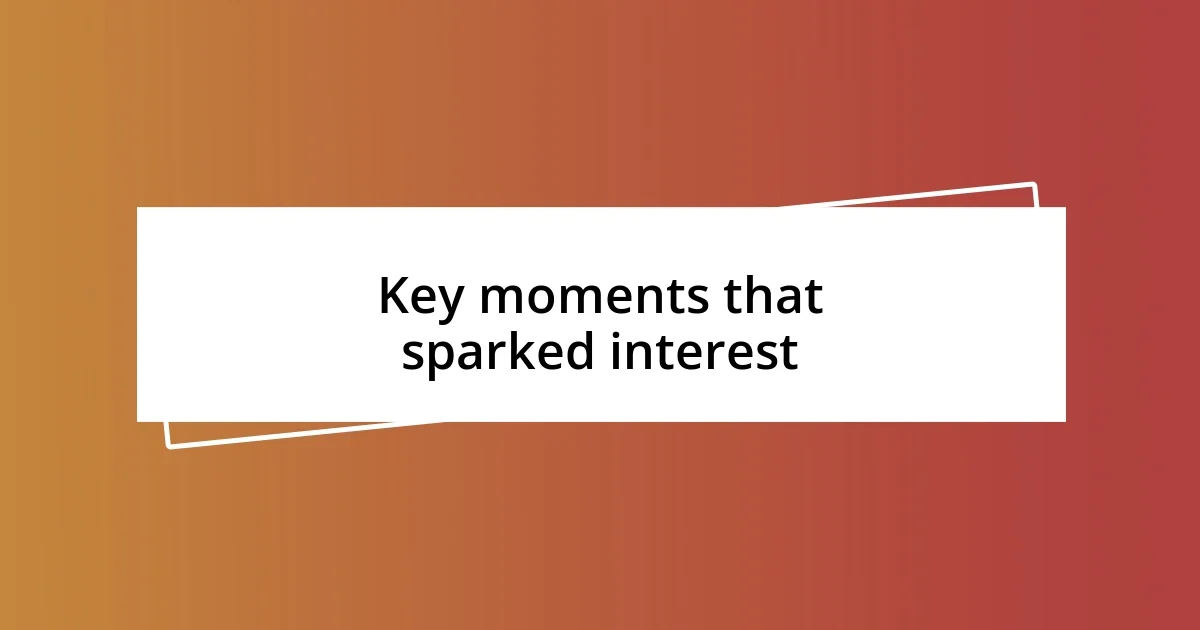
Key moments that sparked interest
One pivotal moment that ignited my passion for screenwriting happened in high school during a drama class. I was cast in a one-act play, and as we delved deeper into our characters, I discovered the magic of dialogue. I remember the rush I felt when I delivered my lines, and the warmth that spread through me as laughter erupted from the audience. It was then I realized the power of words to not only express feelings but also to connect people.
Another significant experience was attending a local film festival. I watched a series of short films created by aspiring filmmakers, each telling unique stories that evoked a wide range of emotions. One particular film, a heartfelt narrative about friendship, left me in tears. I felt a surge of inspiration—I began to envision my own stories unfolding on screen, and the desire to share these narratives with others grew stronger. In that moment, I knew I wanted to create stories that resonated with audiences just as deeply.
Then there was the time I took a summer screenwriting workshop. The instructor emphasized the importance of structure in storytelling, which was an eye-opener. I remember sitting there, pen in hand, as he dissected popular films, revealing the mechanics behind their success. I felt a rush of determination wash over me as I realized this was the road I wanted to travel. It solidified my commitment to mastering the craft and finding my voice in the world of screenwriting.
| Key Moment | Impact on My Interest |
|---|---|
| High School Drama Class | Realized the connection between words and audience emotions. |
| Local Film Festival | Inspired to create narratives that resonate with others. |
| Summer Screenwriting Workshop | Determined to master the craft and find my unique voice. |
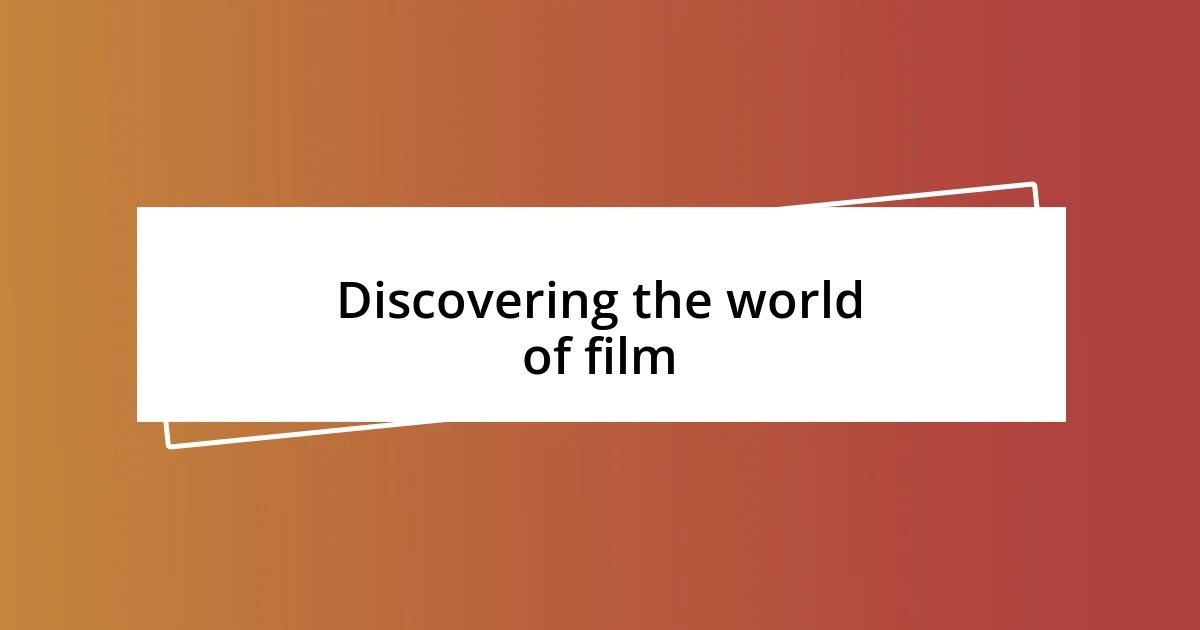
Discovering the world of film
Discovering the world of film felt like stepping into a vibrant dream. I distinctly remember being glued to the screen during a Saturday afternoon movie marathon. Each film unfolded like a new chapter, revealing emotions I hadn’t yet experienced. I marveled at how filmmakers could evoke laughter, tears, and everything in between with mere images and sounds. It was a revelation—this was a medium where stories could come to life in the most enchanting ways. It made me think about how I could harness that power in my storytelling.
- Films allow for an immersive experience that invites viewers into different worlds.
- The combination of visuals, music, and dialogue creates a powerful emotional impact.
- I realized that every frame was filled with intention, from lighting to character expressions, making me want to delve deeper into this art form.
One striking moment that reinforced my love for film was watching “Inception” for the first time. I sat on the edge of my seat, captivated by the complexity of the plot and the sheer creativity of the visuals. Afterward, my mind raced with questions: how did they construct such an intricate narrative? That film challenged my understanding of storytelling and made me eager to explore the mechanics behind it. It felt like an invitation to dive deeper into the craft, and I couldn’t ignore that pull.
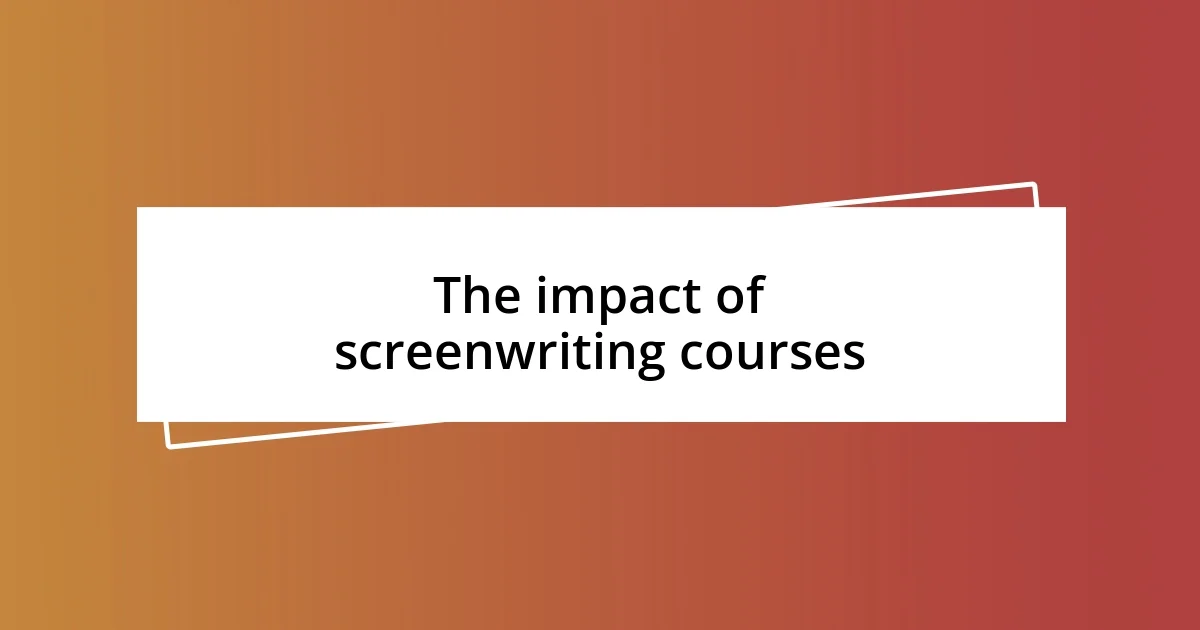
The impact of screenwriting courses
One of the most transformative experiences I had came during a screenwriting course I attended online. I still remember the excitement of logging in each week, eager to share my drafts with fellow aspiring writers. Their feedback helped me see my work from new angles and ignited a fierce desire to improve. Nothing fuels a passion like constructive criticism from a community that shares your goals.
In another session, our instructor had us analyze classic screenplays, sparking a lightbulb moment for me. I was captivated by how every line served a purpose, crafting an intricate dance between dialogue and action. This led me to question: how could I incorporate that level of intentionality into my writing? Each script became a blueprint I could learn from, and I found myself sketching out ideas with renewed vigor.
Attending screenwriting workshops also introduced me to the art of pitching. I vividly recall the adrenaline coursing through me during my first pitch. Sure, I stumbled over a few words, but the thrill of sharing my vision with others was intoxicating. That experience taught me the value of storytelling not just in writing but also as a performance, reminding me that every script is a gateway to connections and conversations.
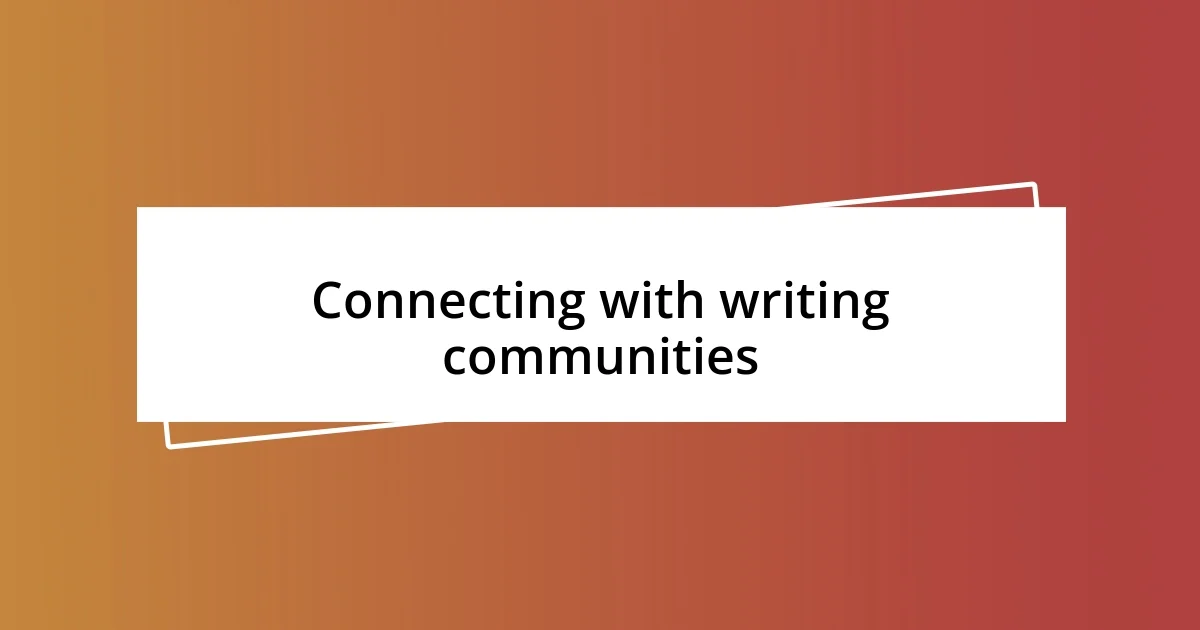
Connecting with writing communities
Connecting with writing communities has been a game changer in my screenwriting journey. It’s like finding a home where everyone speaks your language, filled with shared experiences and ambitions. I remember the first online forum I joined—immediately, I felt a sense of belonging. Sharing my work and receiving responses from passionate individuals was exhilarating. It made me realize I was not alone in the challenges I faced, and that collective support ignited a fire in me.
There was one afternoon during a group chat where we dissected our favorite films. The conversation shifted from admiration to analysis, and I felt a spark of inspiration as we debated the subtle nuances of character arcs. Questions like, “How does a character’s journey reflect their inner conflict?” pushed me to think deeper about my own writing. I started to see my characters not just as plot devices but as living beings driven by their complexities. I could feel my writing improving simply by engaging with others.
Through these connections, I’ve also found accountability partners. I remember setting a goal with a fellow writer to finish our first drafts by a certain date. The pressure to follow through motivated me in a way I hadn’t anticipated. We exchanged encouragement and celebrated small victories together, making the process feel more enjoyable. Isn’t it amazing how much more we can achieve when we have a community cheering us on?
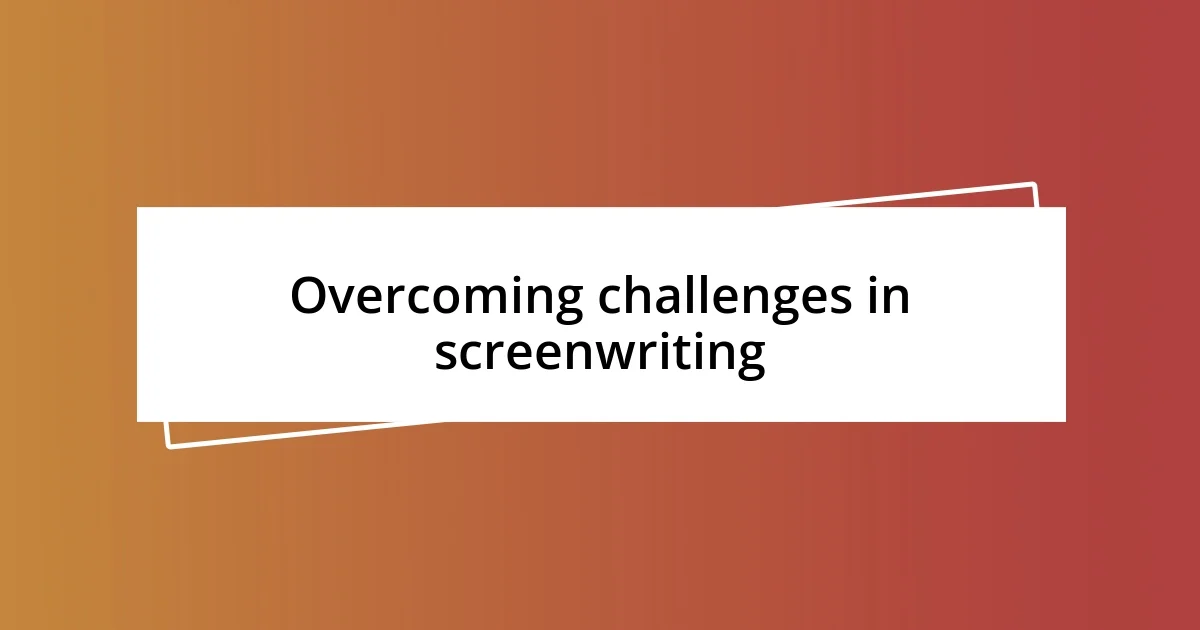
Overcoming challenges in screenwriting
Overcoming challenges in screenwriting often feels like navigating a minefield of self-doubt and creative blocks. I remember sitting in front of my laptop, a blank screen glaring back at me, while my mind raced with thoughts of inadequacy. It was during these moments that I realized the importance of perseverance. Pushing through the frustration not only strengthened my writing but also built my resilience. Have you ever experienced that feeling of wanting to give up, only to push through and find something great? I certainly have, and it’s a transformative experience.
One of the practical challenges I faced was crafting engaging dialogue. Initially, my characters sounded more like robots than real people. I decided to combat this by recording conversations I overheard in cafes or public spaces. Playing them back helped me grasp the rhythm and nuances of natural speech. It was enlightening! This hands-on approach transformed not just my dialogue but also how I viewed the world around me. Have you ever found inspiration in the mundane? Sometimes, the most ordinary moments can offer extraordinary insights.
There were times when I felt overburdened by feedback from peers and mentors. I learned to sift through critiques, holding onto the constructive ones while letting go of negativity. It’s a delicate balance, isn’t it? I remember a particularly harsh review of one of my early drafts that stung more than I expected. Instead of letting it derail me, I turned that pain into fuel. Each critique, once processed, became a stepping stone toward improvement. It taught me that every challenge, even the painful ones, could lead to growth. How do you rethink setbacks in your creative process? For me, they turned into the kindling for my passion.
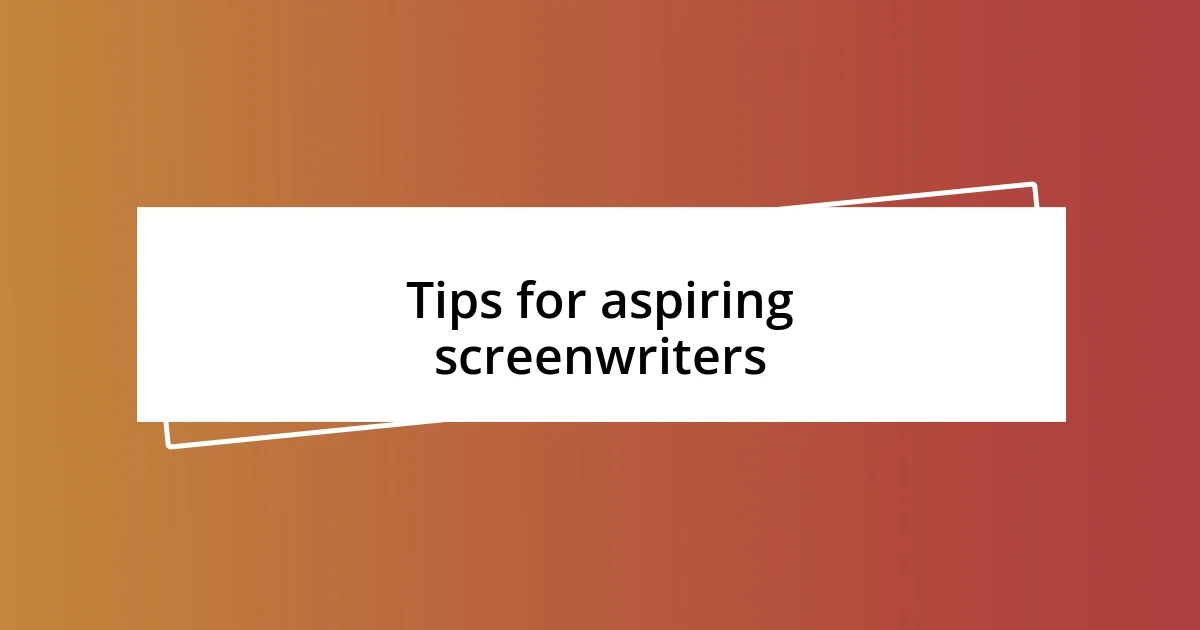
Tips for aspiring screenwriters
I’ve learned that developing a daily writing habit is vital for aspiring screenwriters. I remember when I committed to writing for just 30 minutes every day. At times, it felt daunting—like trying to move a mountain. But what surprised me was how quickly those minutes added up. I began to see it not just as a task, but as a rewarding ritual that fueled my creativity. Have you tried setting aside time for your writing? You might discover that those small, consistent efforts can lead to significant breakthroughs.
In addition to crafting a routine, studying successful screenplays can be incredibly enlightening. I often immerse myself in scripts of films I love, analyzing how the writers build tension and evoke emotion. There was one particularly gripping thriller I dissected that taught me the power of pacing. By studying how the writer escalated conflict, I found new ways to keep audiences riveted in my own stories. Have you ever taken the time to break down a script? I encourage you to dive into this practice—it could reveal hidden gems of insight.
Don’t shy away from sharing your work, even if it feels intimidating. I vividly recall the first time I participated in a local writers’ group. My palms were sweaty as I read my script aloud, but the feedback I received was invaluable. It not only highlighted areas for improvement but also provided a fresh perspective on my characters and plot. Have you considered embracing vulnerability in your writing journey? Opening up to others can be a powerful catalyst for growth, transforming that initial fear into newfound confidence.
